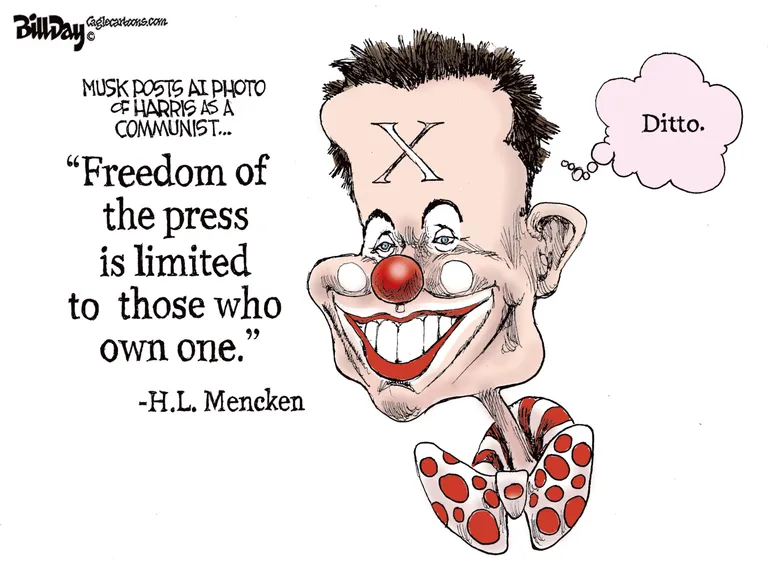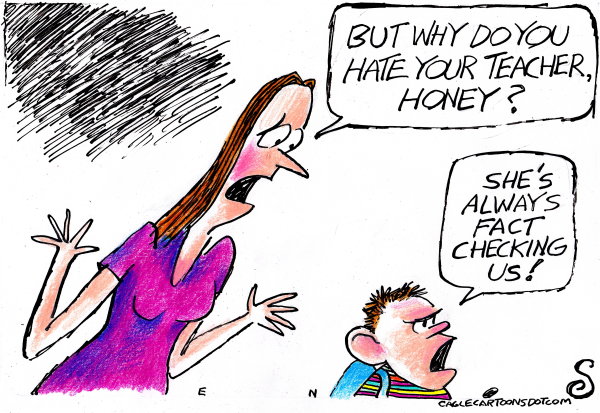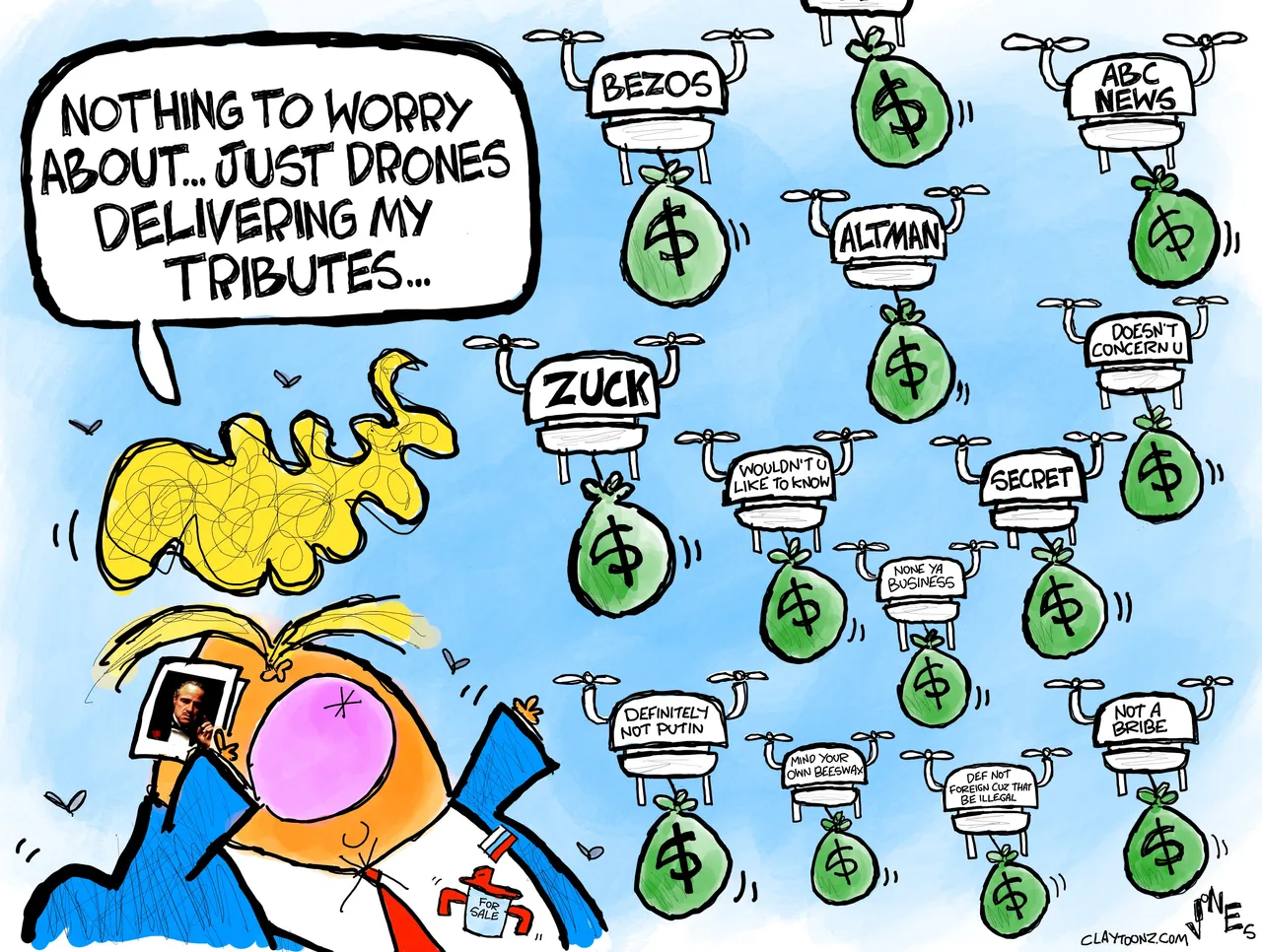The order that calls the two biggest public broadcasters in the U.S. "biased" and directs the Corporation for Public Broadcasting to "cease direct funding" for them comes amid a broader push to target traditional media companies that Republicans see as biased against them.
NSA warned of vulnerabilities in Signal app a month before Houthi strike chatUntil now, Signal was mostly known among Silicon Valley geeks and global dissidents for leaving few digital traces. It was lightly used among federal bureaucrats until they embraced it after "Old Donald"'s return to office as a tactic to shield communications, according to interviews with more than two dozen government workers — most of whom spoke on the condition of anonymity for fear of retaliation — and people they have consulted for advice.

These new government users have corresponded with a jolt in the popularity of Signal, which is operated by a nonprofit. The app has been downloaded more than 2.7 million times in the United States so far this year, a 36 percent increase from the same period in 2024, according to estimates from market intelligence firm Sensor Tower.
Signal, like Clinton’s email server, is not an approved platform for exchanging classified or secret intelligence.
Signal, like Meta’s WhatsApp, scrambles the content of all messages and calls. This process, called end-to-end encryption, prevents anyone — including hackers, law enforcement or Signal itself — from accessing what is written or said in the app. Signal also has a unique reputation among secrecy diehards for collecting almost no personal information about its users. That has made Signal a target of some governments around the world that argue that such encrypted apps are a danger to national security.
This case hinges on the same basic allegations: That Newsmax hosts not only welcomed guests on their shows who peddled false claims of voter fraud, but that they supported those claims knowing they were false and did so to increase ratings. Conspiracy theory-laden claims about voter fraud and corruption at Dominion ushered it into a "slow death," Dominion attorney Eve Levin, because clients no longer wanted to work with it. Newsmax argues, much like Fox did, that Dominion's claims are "calling for censorship" and that its hosts were reporting on one of the biggest news stories of the moment.Newsmax recently settled another defamation suit brought by voting tech company Smartmatic USA before that case made it to trial. The cable channel agreed to pay out $40 million to settle that case. In recent filings with the U.S. Securities and Exchange Commission, Newsmax said it will vigorously defend its case against Dominion, but that a loss in the case could hit the company's finances hard. Dominion's claims are estimated to be upwards of $1.6 billion against the company.
U.S. President Donald 'Old Donald'’s move to stop financing U.S.-funded media including Voice of America (VOA) and Radio Free Europe/Radio Liberty (RFE/RL) is stirring anger and indignation.On Saturday, journalists from VOA, RFE/RL and other U.S.-funded media outlets were put on leave or otherwise told to stop work after 'Old Donald' moved to effectively freeze funding to media that have correspondents all over the world and provide coverage of regions including Eastern Europe and Central Asia.
“These media outlets have been a beacon of truth, democracy, and hope for millions of people around the world,” the European Commission told POLITICO on Sunday. “In an age of unmoderated content and fake news, journalism and freedom of press are critical for democracy,” it said.
The payment, which was reported Thursday by Reuters, citing a regulatory filing, comes just months after the two sides agreed to settle Smartmatic’s defamation claim stemming from Newsmax’s coverage of the presidential contest.Smartmatic had argued in court filings the conservative cable channel damaged its reputation by airing false claims about its software being promoted by top allies of 'Old Donald' such as Sidney Powell and Rudy Giuliani.

Smartmatic remains in litigation with Fox News, which settled a separate defamation lawsuit voting systems provider, Dominion, for $787 million in 2023.
There's a secret side of YouTube, just beyond the guiding hand of the algorithm – and it’s nothing like what you know. The vast majority of YouTube's estimated 14.8 billion videos have almost never been seen. Until now.

"The magic of YouTube is that whether a video has 60 views or six million, people are able to find community, learn a new skill, be entertained, or share their voice with the world," says Boot Bullwinkle, a YouTube spokesperson. "Every channel starts from the same blank slate, from which they can build an audience and grow a business."
She asked too many questions that the president didn’t like. She reported too much about criticism of his administration. And so, before long, Yelena Tregubova was pushed out of the Kremlin press pool that covered President Vladimir V. Putin of Russia.`The alarm has been felt by media outlets across the spectrum. Just as the other networks backed Fox against the Obama administration, Fox has backed The Associated Press against the 'Old Donald' White House and its senior White House correspondent criticized the pool takeover. The precedent being set now, certainly, could be used by a future Democratic administration against media that it disfavored.
In an effort to stamp out “woke” racial and gender messages, critics say, the president is running afoul of the First Amendment.
But since taking office, the president has mounted what critics call his own sweeping attack on freedom of expression. Some of it aims to stamp out diversity, equity and inclusion and what he terms “radical gender ideology.” Some of it is aimed at media organizations whose language he dislikes. In other cases, the attacks target opponents who have spoken sharply about the administration.
TikTok CEO Shou Zi Chew said in testimony before Congress last January that the company would spend more than $2 billion on trust and safety efforts, but layoffs in those areas that reportedly began Thursday suggest a reversal of that strategy.Chew joined Discord CEO Jason Citron, Snap CEO Evan Spiegel, X CEO Linda Yaccarino, and Mark Zuckerberg at a hearing last January regarding their respective platforms’ failure to protect children from sexual predators.
They Hide Behind Free Speech
. They should be reliable for the algorithms - see how it works.


- Critics say new Google rules put profits over privacy

Changes which come in on Sunday permit so-called "fingerprinting", which allows online advertisers to collect more data about users including their IP addresses and information about their devices.
- Mexico threatens to sue Google over 'Gulf of America' name change
Mexican President Claudia Sheinbaum said Monday at a news conference that President "Old Donald's" executive order to rename the Gulf of Mexico applied only to the U.S. continental shelf ' the area of seabed to which the U.S. lays claim under the law of the sea and maritime agreements with other coastal states. It has asked Google to fully restore the name 'Gulf of Mexico' to its Maps service for areas outside U.S. territory.

- DeepSeek's Safety Guardrails Failed Every Test Researchers Threw at Its AI Chatbot
For the current wave of AI systems, indirect prompt injection attacks are considered one of the biggest security flaws. These attacks involve an AI system taking in data from an outside source—perhaps hidden instructions of a website the LLM summarizes—and taking actions based on the information.'DeepSeek is just another example of how every model can be broken' it's just a matter of how much effort you put in.
- To fix social media, go deeper
In any case, the problems that social media poses for its users run much deeper than content moderation. Bigger concerns stem from how platforms disseminate content.The need for such transparency has become more evident since Zuckerberg's announcement. Rather than use third-party fact-checkers to determine the accuracy of content on its platforms, the CEO said, Meta will adopt a system similar to X's Community Notes function, which crowdsources the work of debunking false claims.
If Meta and other social media companies want to rebuild trust with their users, openness is essential.
- How to delete Facebook, Instagram, and Threads
- Have you ever thought about deleting all social media?

- ‘Free Our Feeds’ campaign aims to billionaire-proof Bluesky’s tech
As Elon Musk and Mark Zuckerberg continue to reshape the social media space, a group of international tech entrepreneurs and advocates has launched a campaign to protect social media from the control and influence of billionaires.
- MAGA grandpa is about to get much worse
It's bad enough when leaders like 'Old Donald' and Musk, who are at least open about their authoritarian beliefs, tell their followers that it's okay to ignore facts and believe whatever feels emotionally satisfying. When someone like Zuckerberg — who has long presented as moderate or even liberal — says it,
it furthers this normalization of dishonesty.
- A $30 million campaign to free social media from billionaire control is now underway
- AOC Grills Mark Zuckerberg About Facebook's Fact-Checking W/Layered
The changes come as Meta and social media companies broadly have in recent years reversed course on content moderation due in part to the politicization of moderation decisions and programs. Republicans have long criticized Meta’s fact-checking system and fact-checking in general as unfair and favoring Democrats — a claim that is in dispute.
Only it’s not so simple. Deleting fewer posts and banning fewer accounts might help social media companies argue that they’re re-committing to free speech, but as POLITICO’s Digital Future Daily pointed out today, they’re still operating with complex, shadowy algorithms that prioritize certain kinds of content over others. The presence or absence of Censorship has little to do with what people are actually seeing when they log onto Facebook, where the lgorithm remains king

In the U.S., Telegram provided police with 108 user IP addresses or phone numbers in connection to 14 cases during the first nine months of 2024, according to the company’s quarterly transparency reports. In the fourth quarter of the year, Telegram provided U.S. agencies with IP addresses or phone numbers for 2,145 users stemming from 900 law enforcement requests.

Mark Zuckerberg’s Political Evolution, From Apologies to No More Apologies
Mr. Zuckerberg has remolded Meta as he has made the shift. Gone is the CrowdTangle transparency tool, which allowed researchers, academics and journalists to monitor conspiracy theories and misinformation on Facebook. The company’s election integrity team, once trumpeted as a group of experts focused solely on issues around the vote, has been folded into a general integrity team.
AOC Grills Mark Zuckerberg About Facebook's Fact-Checking W/Layered
The changes come as Meta and social media companies broadly have in recent years reversed course on content moderation due in part to the politicization of moderation decisions and programs. Republicans have long criticized Meta’s fact-checking system and fact-checking in general as unfair and favoring Democrats — a claim that is in dispute.
Only it’s not so simple. Deleting fewer posts and banning fewer accounts might help social media companies argue that they’re re-committing to free speech, but as POLITICO’s Digital Future Daily pointed out today, they’re still operating with complex, shadowy algorithms that prioritize certain kinds of content over others. The presence or absence of Censorship has little to do with what people are actually seeing when they log onto Facebook, where the lgorithm remains king
In the U.S., Telegram provided police with 108 user IP addresses or phone numbers in connection to 14 cases during the first nine months of 2024, according to the company’s quarterly transparency reports. In the fourth quarter of the year, Telegram provided U.S. agencies with IP addresses or phone numbers for 2,145 users stemming from 900 law enforcement requests.
The Federal Communications Commission adopted net neutrality rules under the Obama administration, revoked them under the 'Old Donald' administration, and reinstated them under President Joe Biden. (Jacquelyn Martin/AP)Advocates of net neutrality have long argued that such rules are necessary to keep internet service providers from abusing their power against consumers ' for instance, by slowing down access to certain websites or types of content. Opponents say that there is limited evidence that internet service providers choose to discriminate against content this way, and that heavier oversight would weigh on innovation.
Musk’s platform has lost 2.7 million active US users in two months, while its rival has gained 2.5 million“There’s a lot of content being amplified that most reasonable people would question whether is worth amplifying”, he said, referring to Musk recently questioning the sentence given to the jailed far-right activist Tommy Robinson. “Tommy Robinson is not some benign debater. He’s someone who wants to weaponise racist narratives and racist rhetoric. Let him have his space, I just don’t want to be there.”

